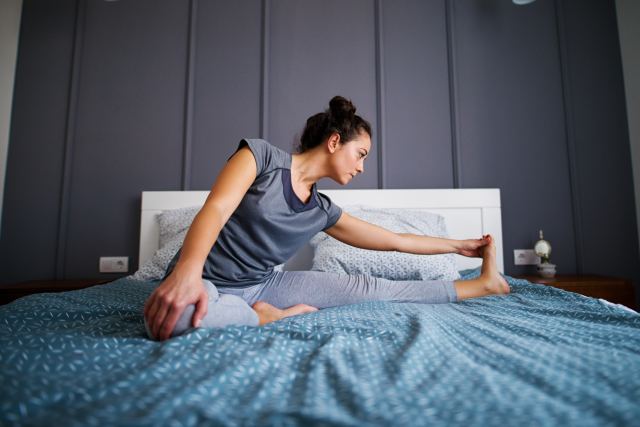
When we think about habits, we often think about bad habits — things like biting fingernails, or the five-year-old who still sucks his thumb. Part of the reason habits are so powerful is that they’re often subconscious in nature. And since we don’t realize we’re doing them, they can be very difficult to break.
But the same can be said for good habits.
For instance, the Whole Life Challenge’s 7 Daily Habits. When these positive ways of being become second nature, you start living a better, healthier life without even having to consciously think about it.
Before we talk about the 7 Daily Habits, let’s reverse engineer this for a moment and consider what it is we’re looking to achieve by developing them:
It’s safe to assume most people are looking to live a long, healthy, happy life free of disease and illness, where they can live independently while pursuing the things that bring them joy for as long as possible.
The 7 Daily Habits are the best way to achieve health, longevity, and happiness. And it’s not just us saying this. Science agrees. Here’s what the research has to say about the 7 Daily Habits:

1. Nutrition
Though there’s a boatload of contradictory information out there about the best diet to follow — vegan versus paleo versus vegetarian versus keto versus raw versus low-carb, gluten-free, and on and on — there are a couple rules we all pretty much can agree upon:
- Whole foods are better than processed foods.
- We should avoid added sugar.
Whether you select the Kickstart, Lifestyle, or Performance level of the Challenge (all of which have slightly different parameters), as a general rule you will be cutting out processed foods and added sugar.
There’s growing evidence that eating processed foods is linked to a shorter life. A February 2019 story published by The Journal of the American Medical Association examined exactly this. The study looked at 45,000 people over the age of 45 over the course of seven years. It discovered that when you control for other factors — including education, obesity, exercise and income — ultra-processed foods increase your risk of death by 14%.
The study considered ultra-processed foods to be things like carbonated drinks, candy, packaged snacks, ice cream, margarine and other spreads, cookies, cakes, pastries, processed meats like hot dogs and sausages, pastas, and pizza, to name a few — all foods that are not WLC-compliant.
On top of processed foods, sugar is the other big no-no, both on the Challenge and according to the latest science. One great resource on this topic is Dr. Robert Lustig, a leading thinker on how sugar is killing us slowly, as it leads to obesity, type 2 diabetes, various cancers, and heart disease. Check out this video from Dr. Lustig on the subject:
2. Exercise
Like nutrition, the science on exercise is also divided in terms of what’s best: cardiovascular exercise versus strength training versus high-intensity interval training and on and on.
There is an argument to be made for all three, which is why we don’t discriminate when it comes to what type of exercise you do on the Challenge. As long as you’re exercising every day — for a minimum of ten minutes — we believe you’re increasing your chance of living a healthier life in various physical and emotional ways.
That said, let’s take a minute to look at what benefits science says you get from different types of exercise (so you understand why we’re so into getting you to do those ten daily minutes).
Cardio:
A 2018 JAMA study looked at 122,000 people and their aerobic fitness, and concluded there’s no such thing as too much cardiovascular fitness when it comes to reducing the risk of death. Higher levels of cardiovascular fitness are associated with a longer life, concluded Dr. Wael Jaber, the lead author of the study.
Not only that but being aerobically fit was even more beneficial for people over the age of seventy, most notably by helping them reduce hypertension. On the other end of the spectrum, poor cardiovascular fitness posed a risk to people with diabetes, smokers, and those with cardiovascular disease.
Strength Training:
Seven of the well-known benefits of strength training, backed by science include:
- Improves metabolism and helps you lose fat
- Helps maintain healthy blood pressure
- Improves heart health
- Helps you sleep better, and might even improve sleep conditions, such as insomnia and sleep apnea
- Reduces risk of type 2 diabetes
- Improves blood lipids
- Improves bone mineral density
High Intensity Interval Training:
Once again, there’s plenty of evidence for various health benefits of high intensity training, including muscle gain, improved metabolism, improved oxygen consumption, and improved heart rate, blood sugar levels, and blood pressure.
Beyond the physical benefits of exercise, are the emotional ones. There’s good reason to believe regular exercise improves mood, as well as help anxiety and depression. This particular study looked at 1.2 million people and showed that all types of exercise improve mental health — most definitely making this habit one of the most important ones of the Challenge.

3. Mobilize
Next in the 7 Daily Habits is mobility. And though mobility and flexibility might not seem as sexy as strength training or conditioning, poor mobility can wreak havoc on your life, especially as you age. If you can’t put your hands over your head without pain or your hips feel tight when you sit down, then even simple tasks like putting things away in the cupboard or getting off a toilet can leave you with an injury.
On the other hand, if you maintain your range of motion in your joints, you will avoid common afflictions associated with aging, such as lower back pain. A flexible muscle is also better at absorbing shock, even from simple activities like walking.
Further, flexibility is also linked to better balance, which is super important as you age, as falling and breaking a hip is not what you want to experience at sixty. In fact, mortality rates in the year following breaking a hip increase by 25%.

4. Sleep
Although we know getting a good night’s sleep is important, many people don’t prioritize it as much as they should. While you might be able to eat processed and fast foods for a week and continue to function, or drink alcohol every night for a week and feel okay, imagine what would happen if you didn’t sleep at all for an entire week? Your state would be utterly dysfunctional.
Though most people don’t go a night without some sleep, let alone a week, the state of sleep health in the United States is poor. According to Sleep Health, 70% of Americans say they don’t get enough sleep, and disorders like insomnia and sleep apnea are on the rise.
Sleep deprivation not only affects your performance in life, including your ability to think clearly, but it also affects your memory, mood, and relationships. It also increases your chance of anxiety and depression. And, physiologically, it increases your risk of high blood pressure, obesity, and type 2 diabetes.
Getting enough sleep, on the other hand, is linked to all kinds of positive life outcomes, including reduced stress, lowered inflammation, and weight loss, as well as keeping you more energetic, more alert, and much happier.

5. Hydrate
Drinking enough water is important for various reasons, namely for maintaining your balance of body fluids, optimal body temperature, and efficient transportation of nutrients. It also ensures that various systems in the body — such as digestion, absorption, and circulation — are functioning optimally. Water is also helpful for proper kidney function, as well as for bowel health.
Further, drinking enough water helps control calories — or at least it helps your feel more full so you don’t overeat. Food with a high water content, such as many vegetables and fruits, usually requires more chewing and is absorbed by the body at a slower rate, which helps you feel satiated longer.
While traditional advice is to drink eight glasses of water per day, it doesn’t necessarily make sense that all of us need the same amount of water as we come in different sizes and do various levels of activity. Thus, we recommend you consume one-third of your bodyweight (in pounds) in ounces of water per day. This means, if you weigh 180lbs, you should drink 1/3 x 180, or 60 ounces of water each day. There are 8 ounces in a cup, so this equates to 7.5 cups of water per day.
This doesn’t mean you should not drink more if you’re thirsty. Your thirst mechanism is there for a reason, but many of us have lost touch with our body’s signals and so we tend to drink too little. In light of this, we like advice to “drink when you’re thirsty,” but also make sure you’re getting at least one-third of your body weight in ounces of water per day.

6. Well-Being Practice
The sixth of the 7 Daily Habits is the most unique. You have probably heard before that mental and emotional health is as important as physical health. So even if you’re exercising, working on mobility, and eating right, if you’re not making a conscious effort to work on your mindset and well-being, then you are missing out on a big part of what makes a happy and healthy human being.
This is the impetus behind the Challenge’s Well-Being Practices: to expose you to a variety of tools and practices that can improve your mindfulness — to help you become more present to your thoughts, reactions, and relationships so you can become calmer, more connected, and ultimately happier. Some Well-Being Practices might instantly resonate with you, while others will not, so the idea is to find the ones that do.
Although “mindfulness” and “well-being” might sound hokey at first, there’s plenty of science to back it up. Research suggests some of the benefits of mindfulness programs, such as meditation or gratitude practice, include improved memory, less stress, better mental and emotional health, better sleep, and a healthier diet. For more, check out this study published in World Psychiatry, which looks at how an integrated approach to well-being can improve mental health.

7. Reflect
And the final of the 7 Daily Habits is a simple one, but many underestimate its power. The purpose of the Reflection habit is to pause and take a moment to ask yourself questions, such as:
- What have I noticed or learned?
- What am I going to change?
- What is working, and what isn’t working?
We don’t just ask you to do this to make the Challenge more work for you. Science says writing down and reflecting about your progress, as well as where you came from and where you want to go, holds you more accountable to your goals — and ultimately more likely to find success. This Forbes article explains that neuroscience says if you write down your goals and reflections, you’re more likely to achieve those goals — as much as 1.4 times more likely.
In short, writing things down helps with both external storage and encoding. When you see your goal written down (that’s “external storage”), the visible cue serves as a consistent reminder.
Meanwhile, “encoding” is a biological process where things we perceive go to the hippocampus in our brain to be analyzed. Once there, we make decisions about what we keep in our long-term memory. Writing improves this encoding process, meaning it helps us remember the things we want to remember.
And when you remember what you’re striving for more clearly and more frequently, you’re more likely to be motivated and dedicated to staying on the course to self-improvement and living a better life. This study published in the Journal of Educational Psychology explains more about this phenomenon.
The Synergy of the 7 Daily Habits
When you combine the Whole Life Challenge’s 7 Daily Habits all together — when you eat whole foods, exercise, and work on your mobility daily; when you drink enough water and sleep enough; and when you focus on your well-being and take the time to process and write down your experience — you will put the wheels in motion for a longer, happier, healthier life.
It’s not just the people behind the Challenge who think so: science says it, too.



































